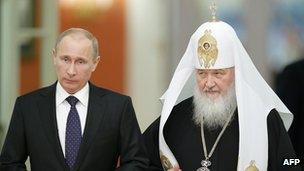Russian MPs back harsher anti-blasphemy law
- Published

President Putin has developed close ties with the Russian Orthodox Church
Russian MPs have given initial approval to an anti-blasphemy law with tougher jail terms or fines for anyone found guilty of offending religious feelings.
The bill was drafted last year after the punk band Pussy Riot performed a protest song against President Vladimir Putin in Moscow's main cathedral.
Two Pussy Riot members are now serving prison terms in remote penal colonies.
The bill says blasphemy could incur up to three years in jail or a fine of up to 300,000 roubles ($9,700;£6,300).
'Historical inheritance'
Russian commentators say the bill appears to have strong backing from Mr Putin. It was passed by the Duma - Russia's lower house - in a first reading on Tuesday.
To become law it has to pass two more readings in the Duma, then a vote in the upper house - the Federation Council - and get a final sign-off by Mr Putin. The entire parliament is dominated by Mr Putin's supporters.
The text refers to offences against religions that are "an integral part of Russia's historical inheritance" - implying that it covers Christianity, Islam, Judaism and Buddhism.
Last August two Pussy Riot performers - Maria Alyokhina and Nadezhda Tolokonnikova - were sentenced to two years each in jail for "hooliganism motivated by religious hatred" over their obscenity-laced "punk prayer" against Mr Putin.
The sentences provoked widespread international condemnation.
Human rights activists and some critics of the new anti-blasphemy bill in the Duma say its wording is too vague and could lead to unjustified prosecutions.
Yuri Sinelshchikov, a Communist MP and former prosecutor, warned that it could provoke "an outburst of combative atheism, in its most aggressive form, and enmity between believers and non-believers".
Some human rights activists warned that "insults to believers" might include the teaching of Darwin's theory of evolution or the Big Bang theory about the universe.
A co-author of the bill, Yaroslav Nilov of the nationalist Liberal Democrats (LDPR), insisted that the text would be amended before the next Duma votes.
- Published10 October 2012
- Published17 August 2012
- Published11 August 2012
- Published17 August 2012